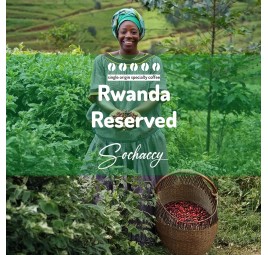Family passion for coffee from the heart of Poland since 2014
3 products


Coffees from Rwanda
Often referred to as the "Land of a Thousand Hills" or the "Land of Gorillas in the Mist," This is a country of incredible natural and cultural richness, despite its small size. Located in the heart of Africa, more than 1,500 kilometers from the nearest seaport,
This african state offers a remarkable variety of landscapes - from mountains and volcanoes, to lakes and rivers, to savannas and forests.
Rwanda's greatest treasure, however, is its coffee, which is the country's main export product, generating as much as 75 percent of its export earnings. The charm of Rwand an coffees lies in the unique growing conditions. Volcanic soils, high altitude and a temperate climate create ideal conditions for the production of high-quality coffee beans.
In our range of Coffees you will find carefully selected arabica and robusta bean coffees, which are characterized by deep flavor, refined acidity and rich aroma. Rwandan coffee is prized around the world for its fruity, chocolate and floral notes, making each sip a true feast for the senses.
Coffee from Rwanda is also the story of the farming communities who are passionately dedicated to growing coffee, striving for perfection in every aspect of its production. We make sure that every coffee bean that goes into our offerings is selected with the utmost care, preserving the fullness of flavor and aroma that coffee is famous for.
Discover with us the richness of flavors of coffees from Rwanda and allow yourself a moment of true pleasure. Tasting coffee from the heart of Africa in the comfort of your home. Our coffee roaster Sochaccy.Co is proud to present exceptional coffees from Rwanda, which allow every coffee lover to discover new, previously unknown flavors and aromas.
History of african coffee
The history of coffee cultivation in Rwanda dates back to the early 20th century, when German colonists introduced Bourbon coffee plantations from the island of Reunion. However, coffee production was limited by ethnic conflict, war and poverty. After the end of the genocide in 1994 and political stability, coffee cultivation became a priority for the government and international organizations. Over the past two decades, coffee cultivation in Rwanda has grown significantly, and coffee has become one of the country's most important exports.
Thanks to investments in plantation development and cultivation technology, as well as improvements in quality, Rwandan coffee has become a valued product in the coffee market.
Rwandan coffees are often classified as specialty coffees, and their unique flavor and aroma from different regions of the country are appreciated by connoisseurs around the world. In addition, coffee production has become an important source of livelihood for thousands of families in rural Rwanda.












































